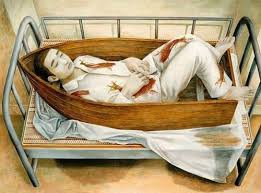This word I often hear the peak when I read the communication theory introduction book by Richard West and Lynn H turner, I rushed to understand it further, because I believe what is learned more deeply will make us become professional.
Yes paradox in the easy sense is contradictory / contradictory truth that I think the easiest
But by a clear paradoxical definition it is a situation arising from a number of premises (what is assumed to be true as the basis of later conclusions, the rationale, reason, assumption, sentence or proposition which is the basis of the conclusion in logic) a statement and will arrive at a conflict or a contradiction.
paradoxical example
there is a Javanese who is shouting in the crowd that all Javanese are liars.
So, whether he, who is also a Java, is a liar? If so, his statement was a lie. So, not everyone is a liar. But if so, it could be that he is not a liar, then his statement may be true that everyone is a liar, so he may be a liar, and so on.
Pinocchio Paradox
pinokio the wooden man whose nose can be elongated if he lies. Actually this pinokio can cause a paradox. One time the pinokio said:
"My nose will be elongated."
the question is, pinocchio words are lie or honest?
If the word pinocio lies that his nose will be elongated, it means his nose will not elongate.
But if the nose is not elongated it means pinocchio is telling the truth
otherwise if pinocio honestly says that his nose will be elongated, it means his nose will indeed elongate. But his nose could not be elongated if he was honest. Pinocchio means lying.
one more example to be more ngeh 😀

Omnipotence paradox (Paradox of powerlessness)
Omnipotence comes from the Latin word omne which means everything / everything and potence which means ability or power. This classic paradox is expressed as follows:
"Can God create such a heavy stone that He Himself can not lift it?"
This is also known as stone paradox.
How do you think the answer is?
If you answer can, then God is not all-powerful because He can not lift the stone.
If you answer can not, then God is not all-powerful because He is not able to create the stone as intended.
For religious people is like a fruit simalakama whatever the answer God is still not in power.
But is that right?
There is something wrong with our assumptions. Let us analyze the structure of the sentence once more. If it is rebruped it will be:
"Can God have power not to dominate?"
If the form of a sentence like this is certainly our religion will directly answer can not be. We always assume that 'God is not impossible', and 'God can always' whatever it is. Because we are prejudiced "Can it always be positive".
Do not worry, there are actually many things God can not do in religious doctrine:
1. God can not possibly do evil
2. God can not be imperfect
3. God can not possibly put bad people into heaven
and much more, you can add it yourself.

0 Response to "The Definition of Paradox"
Post a Comment